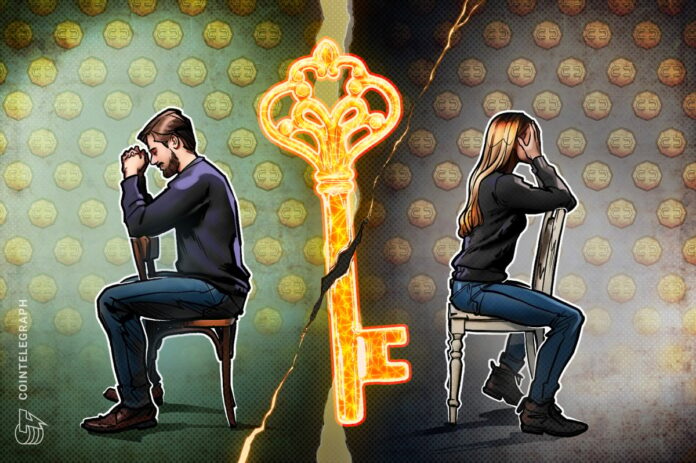Divorcing in the Digital Age: How to Share Crypto Assets
Imagine going through a divorce and having to divide not just your house or bank account, but also your Bitcoin stash. Welcome to the modern world, where digital assets like cryptocurrency are now considered part of the marital property. But can you divide a private key in half? The answer is no, and it’s a crucial thing to understand when navigating the complex world of crypto and divorce.
What is a Private Key in Crypto?
A private key is like the password to your cryptocurrency – a long, unique series of letters and numbers that allows you to access your crypto wallet and send or receive funds. If someone else gets their hands on your private key, they can spend your crypto, and if you lose it, you lose your crypto forever. Think of it like a bank vault, but for digital money, or a house key – if someone has it, they can get in.
Can You Share a Private Key in Half?
The short answer is no, not directly. A private key is a single, indivisible data string, like trying to cut a password in half and expecting each half to work – it just doesn’t. If you try to share a private key, you risk losing access to your resources permanently. For example, let’s say your private key is 5KB8KLF9ZGWQNOGIDDA76MZPL6SZY36HWXMSSZNYXYB9KF. If you split it in half, neither half will unlock the wallet, and if either half is lost or changed, the entire key is lost forever.
How to Share Crypto Access
Fortunately, although a private key can’t be divided, there are secure methods that enable shared access and control of funds. Let’s explore three useful options for managing shared crypto property:
1. Shamir’s Secret Sharing (SSS)
This method allows you to divide a private key into several parts, and only some of them are needed to rebuild it. You can specify how many shares are required to reconstruct the original key. For example, you can divide a private key into three parts and need two out of the three to unlock it. This provides redundancy, security, and flexibility – ideal for divorces, business transactions, or any situation where control needs to be shared but not easily abused.
2. Multi-Signature Wallets (Multisig)
Multi-signature wallets require multiple keys to move crypto. It’s like a digital safe that needs more than one private key to approve a transaction. You can set up a multisig wallet with tools like Electrum, Casa, or Gnosis, defining how many keys are needed to unlock it. For instance, in a two-out-of-three setup, Key 1 goes to spouse A, Key 2 goes to spouse B, and Key 3 goes to a neutral third party, such as a divorce lawyer or mediator. This setup is useful in divorce cases, as it ensures that both parties have control over the funds and prevents one person from acting alone.
3. Custody Services or Legal Trust Agreements
In some situations, especially when emotions are high or trust is low, a third party (administrator) can hold the private key and manage transactions based on a legal agreement. For example, a law firm or crypto custodian bank can hold the private key until an agreement is reached. This guarantees that funds are not moved prematurely, legal fairness is enforced, and the process follows agreed-upon conditions. Custody services are common in estate planning and high-value divorce proceedings.
Real-World Example: Woman Discovers Bitcoin in Divorce Battle
As cryptocurrency becomes more mainstream, it’s increasingly used to hide assets in divorce cases. A New York woman discovered her husband’s secret Bitcoin stash worth $500,000 (12 BTC) during their separation and turned to legal experts. Lawyers report that digital assets now appear in up to half of divorce cases, with many courts struggling to keep pace. Since crypto often exists outside of banks and has no centralized oversight, it’s difficult to detect, especially if one spouse is more tech-savvy than the other.
Can Digital Wallets be Traced in Divorce?
Yes, despite their reputation for anonymity, digital wallets and cryptocurrency transactions can be traced, particularly with the help of forensic accountants and blockchain analysis tools. As crypto becomes more common, it’s increasingly treated as a marital asset, subject to the same distribution rules as other forms of property. The key takeaway for divorcing couples and lawyers is that crypto is property, not cash, and it must be disclosed, valued, and potentially shared or divided.
Beyond Divorce: Inheritance, Trusts, and Partnerships
The need to share or share crypto access extends far beyond divorce. These tools are also useful for estate planning, family trusts, and business partnerships. By using methods like Shamir’s Secret Sharing or multi-signature wallets, you can ensure that crypto is safely passed on to heirs, given to children or family members with limited access, or managed by multiple parties in a business setting.
Crypto Estate is a Human Affair
Even though crypto is digital, it’s how we manage, divide, and share it in human relationships and trust that matters. You can’t divide a private key in half, but with the right tools, you can divide access, share control, and share value fairly. As cryptocurrency evolves from niche technology to mainstream asset, it’s essential to know how to manage and divide it responsibly, especially during life events like divorce, inheritance, or business dissolution.

